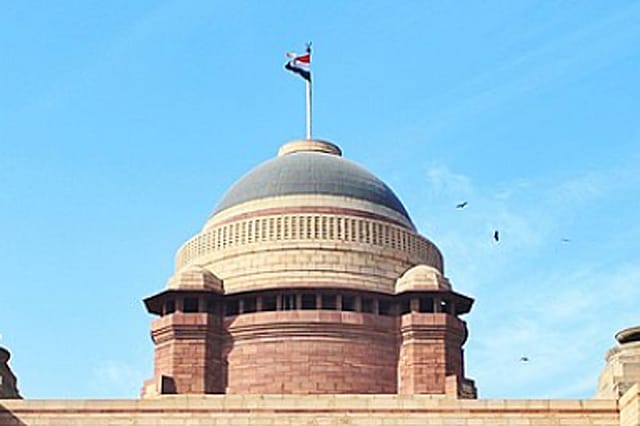Durbar Had To Go

THE LUCKY FEW who had been shown into the Durbar Hall of the rashtrapati's house would have been struck by its courtliness. The mammoth Belgian chandelier that dangles over the 'head of the Republic' from the domed hall illuminates a day punctuated by crusty protocol. Essentially, fripperies fit for a regent.
Beyond the protocol, there is the Durbar Hall's statuary to contend with. The imperious 'presidential bodyguard' ensures the invitees keep their distance. Proximity, after all, could rob the éminence grise of alluring quintessence.
Indeed, the British may have exited the scene, but the stiff upper lip still defines the visage of the liveried sentinels of Rashtrapati Bhavan.
Once the eye has furtively surveyed the scene, it settles upon the president, sitting on a throne atop an altar framed by an apse looking benignly onto the assembled 'Durbar'.
In this crusty and frosty Durbar Hall, all the talk of Rashtrapati Bhavan being the 'symbol of the nation' that is 'accessible to the people' rings hollow.
So, one was glad to hear that President Droupadi Murmu has landed the first blow on 'durbarism'. The press release from her office informed us that Her Excellency was "pleased to rename two of the important halls of Rashtrapati Bhavan—namely, 'Durbar Hall' and 'Ashok Hall'—as 'Ganatantra Mandap' and 'Ashok Mandap', respectively."
AIming High
20 Feb 2026 - Vol 04 | Issue 59
India joins the Artificial Intelligence revolution with gusto
The communiqué also noted the reasons for the decision. It explained that the "term 'Durbar' refers to courts and assemblies of Indian rulers and the British. It lost relevance after India became a Republic, that is, 'Ganatantra'. The concept of 'Ganatantra' is deeply rooted in Indian society since the ancient times, making 'Ganatantra Mandap' an apt name for the venue."
For added emphasis on republicanism, the 'Ashok Hall' that was originally a ballroom, has also been renamed. The Rashtrapati Bhavan has pronounced that the word 'Ashok' among other things "refers to the Ashok tree which has deep significance in Indian religious traditions as well as arts and culture. Renaming 'Ashok Hall' as 'Ashok Mandap' brings uniformity in language and removes the traces of Anglicisation while upholding the key values associated with the word 'Ashok'."
But to ensure that 'nameplate nationalism' is truly imbued with meaning, change must go beyond the superficial.
There is a need to redefine the presidency itself. A welcome beginning has been in the area of ensuring greater representation to the highest constitutional office. President Murmu is a tribal from modest means and her myth has grown in office, giving hope that India's democracy is also the embodiment of diversity. But more could be done. Perhaps, the time has come to reserve a percentage of presidential appointments for marginalised communities. Also, the president's council could be made to mandatorily reflect India's diversity.
But if governance is to be truly inclusive, transparent, and subject to meaningful checks and balances, the president's office needs to be rid of the impression that it is no more than a sinecure. One increasingly hears unedifying phrases like 'rubber stamp', 'glorified political appointee', 'cheerleader' to define presidents. This impression can be reversed by granting the president more discretionary powers restricted to addressing national crises and emergencies. The president could also be allowed to take proactive measures on critical issues like corruption, the economy, and national security. To ensure against overreach, the president's office could also be simultaneously subject to increased accountability. One step could be to introduce impeachment procedures for the president. Another measure could revolve around establishing an independent advisory body to monitor the president's performance.
Some may flinch at the breadth of these suggestions. And this article does not purport to know all the answers, but there is no gainsaying that the president's office today needs to not just be seen as more effectively relevant, but be so. A debate that goes beyond quibbling over nomenclature is needed. And such an inquiry would be a more fitting tribute to the legacy of the legendary 'Ashok' of yore.
